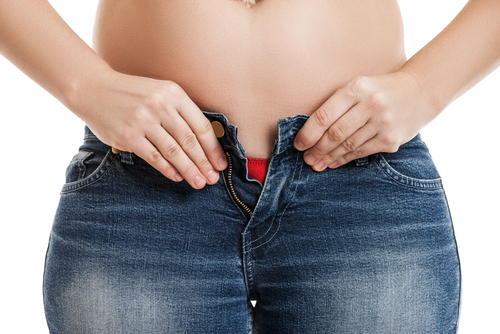Stress:
Stress activates the fight-or-flight response, which is the body’s involuntary response to a threat that makes your heart pound and your breath shorten. The main hormone released during this response is the stress hormone Cortisol. Today’s modern, deadline filled, over-scheduled lifestyle can overtax the adrenal glands, which causes stress and causes the body to produce way too much Cortisol. Raised Cortisol boosts your insulin levels, which can cause you to pack on the pounds, especially around the midsection. Cortisol automatically kicks up your appetite, prompting you not only to want to eat huge quantities of food, but to want sweets and simple carbohydrate foods in particular. These foods ultimately make insulin levels spike and then plummet, which will leave you caught in a vicious cycle of feeling hungrier than ever-and eating again. It is a vicious cycle. Take the steps necessary to address your stress now: eat a nutrient rich diet, learn to say “no”, meditate, exercise, go to bed and get up at a set time, laugh, get a massage – any number of these can cause your Cortisol levels to begin to drop. And finally - get your 8 hours of sleep each night - in total darkness. Research has shown that even a little bit of light is enough to cause an increase in stress hormones. Artificially sweetened diet foods and drinks: A huge mistake many people make is thinking that artificial sweeteners are the answer. On the contrary: studies have shown that those who consume foods with artificial sweeteners have a 41% increases risk of becoming overweight or obese. The reasoning is that artificial sweeteners confuse the body’s ability to recognize that it has had enough food and it causes more cravings for sweet food to make up for the calorie deficit. When your body is not fed nutrients, it asks again and again for more food, triggering the heavy-duty cravings. Artificial sweeteners can also cause havoc with your metabolism in the same way sugar does. The best bet is an all-natural sweetener, like stevia. Undetected food allergy or intolerance: Food intolerances or sensitivities are a relatively new concept in relation to weight gain/loss, but they’re running rampant. Many people are walking around feeling unwell to some degree, but until recently, rarely has a connection been made between a symptom and a specific food. There are distinct signs to watch for when eating foods. These signs can include fatigue, bloating, weight gain, diarrhea, gas, and other digestive issues. Blood tests can confirm food intolerances if you suspect you are having issues with a certain food. Once you identify the offending food in your diet and learn to avoid it, your body and health will begin to change. As a result of identifying a sensitivity to gluten or dairy for example, many people will find they naturally begin to lose weight as digestion improves, and cravings begin to fade. Toxic products in your home: Toxic chemicals from common household cleaning agents, cosmetics, plastics and more are being stored in the fat tissues of your body fueling disease, slowing your metabolism, and adding up to unhealthy weight gain. Chemicals, such as polychlorinated biphenyls (PCBs), disrupt normal endocrine activity in the body. These hormone disruptors can fatten you in many ways, including interfering with the activity of estrogens, androgens, and other hormones that regulate fat metabolism in the body. Choosing non-toxic items over toxic ones, using a carbon water filter, choosing glass over plastic and metal, moving towards more natural cleaning products, and being aware of the biggest offenders can go a long way to detoxifying your life and looking and feeling better. Hidden insulin triggers: Sugar is a given, we have already established how it causes your body to release insulin to balance the rise in blood sugar. The not so obvious offenders include white flour foods, some starchy vegetables, and even whole grain flour products can cause issues for those who are insulin sensitive. Healthy sweeteners such as honey can also cause unwanted insulin spikes. The human body doesn’t discriminate between sugar from white flour, potatoes, or honey; they all turn to sugar upon digestion. Foods that are also high is fiber help reduce the insulin spike which is why fruit is an acceptable addition to your diet, but even with fruit it is sometimes necessary to cut it out temporarily to kick start the first couple of weeks of a weight loss plan. The key to losing weight is controlling the insulin response that your body will go to the next available energy source: your stored fat, and use it for fuel. MSG in your food: Monosodium glutamate aka MSG, is a chemical that’s often used to add flavor to processed foods and Chinese takeout. This food additive does more than add flavor, it may be a factor in obesity. It has become mainstream knowledge that MSG causes headaches and other bad reactions in people who who are sensitive to it, and unfortunately many food manufacturers responded to it by looking for ways to get around listing it on their labels. Be label savvy! Watch ingredient lists for words like “glutamate,” which triggers the same kind of reactions as MSG. MSG may also be hidden in other food additives like caseinate, autolyzed yeast enzymes, beef or chicken broth, natural flavorings, hydrolyzed protein, soy isolates, soy protein, and soy protein concentrates. Hormone imbalance: Hormones have a lot of responsibility in the body. Hormones tell you you’re hungry; hormones tell you when you’re full. Hormones tell your body what to do with that food — whether to store it or burn it as fuel. Hormones tell your body how to consume energy stores when you exercise, hormones control almost every aspect of how you gain or lose weight. When it comes to weight loss, having balanced hormones is absolutely crucial. Between stress hormones, thyroid hormones, hunger and satiety hormones, serotonin, testosterone and estrogen – there are a lot of players involved in either keeping you thin or packing on the pounds. Fat- Free foods: There has been a huge increase in obesity that coincides with the fat-free craze that ensued a few years back. The largest consumer group for fat-free foods is North Americans, who also happen to have the highest rates of obesity in the world. When fats are removed from foods, they are typically replaced with sugar, sodium, artificial sweeteners and a plethora of chemicals. The total calories in the fat-free food item is usually close to its full fat counterpart, but the difference is that fat free foods don’t provide the same level of satiation causing people to actually eat MORE calories in a day. What’s even worse, when sugar is absorbed into the bloodstream, glucose levels rise causing the pancreas to release insulin to move the sugar into cells of the body to be used as energy. An overindulgence of sugar causes stress on the pancreas leading weight gain because excess sugar is stored in the cells as fat. The hormone glucagon is responsible for taking fat out of storage to be burned off as fuel, but when the body is producing too much insulin, glucagon cannot be produced resulting in the body’s inability to efficiently burn fat stores. Feeding Your Thirst Often people may think they are hungry when in reality they just need a big glass of water. If you’re not sure whether you’re hungry or thirsty, assume it’s the latter. Drink water or have some herbal tea and see how you feel after a few minutes; dehydration could be leading you to consume extra calories. Staying well hydrated and drinking water before meals and throughout the day can help you lose weight. Medications Weight gain can often be a side effect of some medications. Psychiatric medications to treat bipolar disorder, schizophrenia, and depression, along with heart medications like beta blockers, commonly cause weight gain. If you suspect your medications may be behind your weight gain, you may want to schedule an appointment with your doctor to discuss alternative solutions. |
Connect:Healthy Habits
are formed by conscious choices that soon become unconscious ways of life. The good news is you have full control over this!
AboutLynnel is a Holistic Nutritionist, Director of the NutraPhoria School of Holistic Nutrition, Author, and Motivational Speaker. Click HERE to learn more. You can get new recipes & health boosting posts straight to your inbox each week! Enter your email below. :) Archives
April 2024
Categories
All
|
|
© Lynnel Bjorndal ~ Healthy Holistic Habits
|




 RSS Feed
RSS Feed





